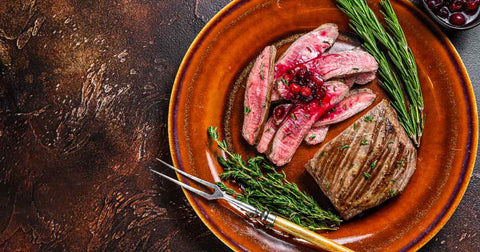If you’re exploring new protein options or looking to diversify your meals, you may be asking: is lamb good for you? Lamb has long been a culinary staple in many cultures, praised for its rich flavor and nutritional profile but is it actually a healthy choice?
In this article, we’ll explore the facts behind lamb meat, including how it compares to other red meats, whether lamb is healthy, and answer the common question: is lamb healthier than beef? We’ll also discuss how food sensitivity can play a role in how your body responds to lamb and when to consider a food sensitivity test kit.

What Is Lamb Meat and How Is It Typically Consumed?
Lamb meat refers to the meat of a young sheep, typically less than a year old. It’s known for its tender texture and slightly gamey flavor and is commonly eaten as:
-
Lamb chops
-
Leg of lamb
-
Ground lamb
-
Lamb shank
-
Lamb stew or kabobs
It’s categorized as red meat due to its myoglobin content and is often used in Mediterranean, Middle Eastern, and Indian cuisines.
Is Lamb Healthy Compared to Other Meats?
So, is lamb healthy? The short answer: yes, lamb can be a highly nutritious addition to your diet when consumed in moderation and prepared properly.
Key nutritional highlights of lamb (per 3 oz cooked serving):
-
Calories: ~250
-
Protein: ~23g
-
Total fat: ~17g (with ~7g saturated fat)
-
Iron: ~2 mg (a great source of heme iron)
-
Zinc: 25–30% of daily value
-
B12: Over 100% of daily requirement
-
Omega-3s: Higher than many other land-based meats
Lamb provides high-quality protein, essential vitamins, and minerals making it especially beneficial for individuals needing support with iron levels or energy metabolism.
Is Lamb Healthier Than Beef?
If you’re comparing meat options, you may be wondering: is lamb healthier than beef?
Here’s how lamb compares to beef:

-
Fat content: Lamb generally has more saturated fat, but also slightly more omega-3 fatty acids (especially if pasture-raised).
-
Iron and zinc: Both meats are rich sources of these nutrients.
-
Flavor and digestibility: Many people find lamb easier to digest than beef, especially if cooked in smaller portions with herbs and spices.
-
Additives: Lamb is less likely to be grain-fed or hormone-treated, especially when sourced from New Zealand, Australia, or small farms.
While both can be part of a healthy diet, lamb offers a unique nutritional profile that may make it more appealing for some people especially when looking for variety beyond typical red meats.
Is Lamb Good for You If You’re Watching Cholesterol or Fat?
Lamb is naturally higher in fat than some lean meats like chicken or turkey. However, the fat in lamb includes conjugated linoleic acid (CLA), which has been studied for its anti-inflammatory and potential fat-burning effects.
To enjoy lamb healthfully:
-
Choose lean cuts like leg, loin, or shank
-
Trim visible fat before cooking
-
Use healthy preparation methods (grilling, baking, braising)
-
Pair with fiber-rich vegetables to balance your meal
As with any red meat, moderation is key particularly for individuals managing heart health or cholesterol levels.
Can You Have a Food Intolerance to Lamb Meat?

Even if lamb is nutritionally dense, some individuals may not tolerate it well due to food intolerance. This is different from a food allergy and often involves a delayed digestive or inflammatory response.
Signs you may have a food sensitivity to lamb include:
-
Bloating or cramping after eating
-
Fatigue or brain fog
-
Skin reactions or eczema
-
Headaches
-
Joint discomfort
If you notice consistent discomfort after eating lamb or other red meats, a food sensitivity test kit can help determine if your body is reacting negatively. Identifying and eliminating trigger foods can improve digestion, mood, and overall wellness.
Is Lamb Meat a Good Source of Nutrients?
Yes lamb is especially valuable for its high levels of:
-
Heme iron, which is more easily absorbed than plant-based iron
-
Vitamin B12, essential for red blood cell production and brain function
-
Zinc, which supports immune health and wound healing
-
Selenium, an antioxidant that protects against oxidative stress
These nutrients are particularly important for women of childbearing age, individuals with anemia, and those following limited diets.
Final Thoughts: Is Lamb Good for You?

Lamb is good for you when eaten in moderation and as part of a balanced diet. It delivers essential nutrients like protein, iron, B12, and healthy fats while offering a flavorful alternative to more common red meats.
However, like any food, it may not agree with everyone. If you experience discomfort, fatigue, or other symptoms after eating lamb, it could be a sign of food intolerance and a food sensitivity test kit can help uncover what your body may be reacting to.
For most people, especially when sourced well and cooked cleanly, lamb can be a nutrient-rich, satisfying addition to your plate.
Frequently Asked Questions (FAQs)
1. Is lamb healthier than beef?
Lamb can be slightly higher in healthy fats like omega-3s and CLA, but also contains more saturated fat. Both are nutrient-dense when consumed in moderation.
2. What nutrients are found in lamb meat?
Lamb is rich in iron, vitamin B12, zinc, protein, and selenium.
3. Can lamb cause food intolerance symptoms?
Yes. If lamb causes bloating, fatigue, or skin issues, it could indicate a food intolerance, which can be confirmed with a food sensitivity test kit.
4. Is lamb good for heart health?
Lean cuts of lamb, when eaten occasionally, can be included in a heart-conscious diet. Avoid fatty or processed cuts and choose healthy cooking methods.
5. What is the best way to cook lamb for health?
Grilling, roasting, or braising with herbs and olive oil are great choices. Avoid frying or serving it with heavy, creamy sauces.


.png?v=1737390083)
.png?v=1737187409)


